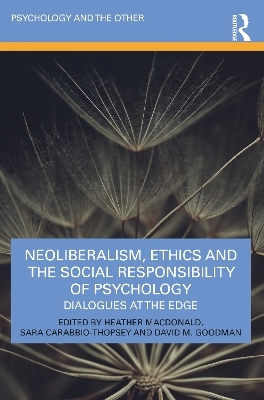
Neoliberalism, Ethics and the Social Responsibility of Psychology
Routledge (Verlag)
978-1-032-24771-7 (ISBN)
This volume encompasses deeply critical dialogues that question how the field of psychology exists within and is shaped by the current neoliberal political context. Spanning from psychoanalysis to post-colonial theory, these far-reaching discussions consider how a greater ethical responsiveness to human experience and sociopolitical arrangements may reopen the borders of psychological discourse.
With the understanding that psychology grows in the soil of neoliberal terrain and is a chief fertilizer for neoliberal expansion, the interviews in this book explore alternative possibilities for how this field of study might function. By offering their own unique responses regarding the current condition of their respective disciplines, these scholars critically consider the current conceptual frameworks that set the theoretical boundaries of psychology, and contemplate the ethical responsibility currently affecting the field.
This book will prove essential for scholars and students across several disciplines including psychology, philosophy, ethics, and post-colonial and socio-cultural studies, as well as practising mental health professionals with an interest in the importance of psychological social theory.
Heather Macdonald is a core faculty at Fielding Graduate University in their Clinical Psychology program. Dr. Macdonald’s scholarly research focuses on the interface between culture, social justice, relational ethics, clinical practice, and post-colonial thought. Sara Carabbio-Thopsey is a licensed clinical psychologist serving children and families in the greater Boston area. Her interests include the historical, cultural, and neoliberal complexities that impact children. David M. Goodman is Associate Dean for Strategic Initiatives and External Relations at the Lynch School of Education and Human Development at Boston College, where he also serves as the director of Psychological Humanities and Ethics.
Introduction: Manic Societies and Overfunctioning Sciences; 1. The Personal Is Political: A Conversation with Jeff Sugarman; 2. Subjectivity and the Critical Imagination in Neoliberal Capitalism: A Conversation with Thomas Teo; 3. Culture, Context, and Coloniality: Bhatia's Decolonizing Psychology and Kirschner's Sociocultural Subjectivities; 4. Psychology as Apparatus: An Interview with Sam Binkley; 5. Infinite Greed and Transcendental Materialism: A Conversation with Adrian Johnston; 6. On Destructiveness: A Conversation with Sue Grand; 7. Taking Persons Seriously: A Conversation with Jack Martin; 8. Philosophical Hermeneutics and Psychological Understanding: A Conversation with Frank C. Richardson
| Erscheinungsdatum | 16.06.2022 |
|---|---|
| Reihe/Serie | Psychology and the Other |
| Verlagsort | London |
| Sprache | englisch |
| Maße | 156 x 234 mm |
| Gewicht | 440 g |
| Themenwelt | Geisteswissenschaften ► Psychologie ► Psychoanalyse / Tiefenpsychologie |
| Medizin / Pharmazie ► Medizinische Fachgebiete ► Psychiatrie / Psychotherapie | |
| Recht / Steuern ► EU / Internationales Recht | |
| Recht / Steuern ► Privatrecht / Bürgerliches Recht ► Medizinrecht | |
| Sozialwissenschaften ► Politik / Verwaltung ► Politische Theorie | |
| ISBN-10 | 1-032-24771-1 / 1032247711 |
| ISBN-13 | 978-1-032-24771-7 / 9781032247717 |
| Zustand | Neuware |
| Informationen gemäß Produktsicherheitsverordnung (GPSR) | |
| Haben Sie eine Frage zum Produkt? |
aus dem Bereich


